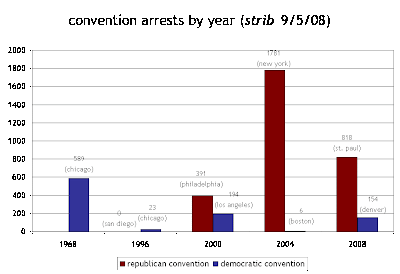 to offer a little context on social control at the republican national convention, the minneapolis strib published data on the number of arrests in each party’s national convention for 1996, 2000, 2004, and 2008.
to offer a little context on social control at the republican national convention, the minneapolis strib published data on the number of arrests in each party’s national convention for 1996, 2000, 2004, and 2008.
i’m skeptical of the data quality here, especially with respect to reporting differences in the number of arrests attributed to the convention. if the data can be trusted, however, arrests at republican conventions have outpaced those at democratic conventions for at least the last three conventions. the strib’s randy furst and anthony lonetree offer a useful companion piece regarding changes in convention policing since the 1999 WTO protests. an excerpt:
St. Paul and Denver each received $50 million in federal funds for policing the conventions. Tony Bouza, former Minneapolis police chief, said he thinks St. Paul could have handled the security with a few hundred extra police officers. “The only reason they did it was an orgy of overtime, subsidized by the United States government under the National Security Act,” he said.
hmm. ol’ chief bouza was never one to mince words…



